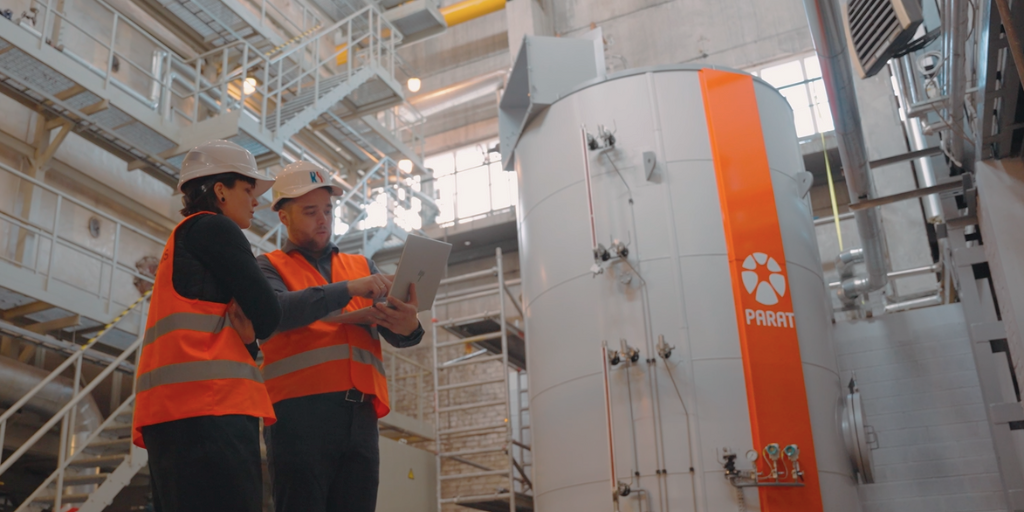Riga’s main heat supplier, RĪGAS SILTUMS, is taking steps to transform the city’s heat supply. Having recently implemented a major electrification project, the company is now exploring options to introduce a pioneering heat storage solution for the Latvian capital.
Maksis Apinis, Green Liberty | 24 June 2025

RĪGAS SILTUMS is the main supplier of heat energy in Riga, covering around 76 per cent of the city’s total heat energy demand. The company produces 32 per cent of this heat itself, with 54 per cent of its own production sourced from biofuels – primarily woodchips and pellets – and 46 per cent from fossil gas. The remaining heat is purchased from Latvenergo – one of the largest energy utilities in the Baltic region – as well as from other independent producers. However, fossil gas still dominates these external sources, accounting for 64 per cent of the purchased heat energy, with woodchips making up the rest.
In April of this year, an electrode boiler was delivered to the Imanta heating plant (located in the western part of the city) to support frequency balancing of the electricity system. The project is expected to generate considerable additional income, marking a major step towards electrifying Riga’s heat supply. It’s also the first boiler of its kind in Latvia, with others expected to follow suit.
Balancing Latvia’s power grid
In February, Latvia and the other Baltic states disconnected from the BRELL network – the joint electricity grid connecting Belarus, Russia, Estonia, Latvia, and Lithuania power grid previously controlled by Moscow – and synchronised with the European energy system via the LitPol Link transmission line.
This means that Latvia is now fully responsible for maintaining the stability of its electricity grid and ensuring that frequency remains within required limits at all times. This shift has significantly increased the importance of the Baltic electricity balancing reserve market, which had previously been more formal than functional. The market’s role is to maintain the stability of network frequency, preventing it from dropping too much due to insufficient electricity supply and from sharp rises when in excess.
Following the disconnection from BRELL, Latvia has joined the European balancing energy exchange platform, where companies contribute to grid stability by either consuming excess electricity or supplying additional capacity. These balancing services must respond within seconds or minutes and are compensated through a market-based system. Similar to regular electricity auctions, companies predict their availability and costs in advance.
Interest in this market has grown as a result of the expansion of renewable electricity capacity. Since generation from wind and solar sources varies and may not reflect actual demand, the need for a flexible balancing system has increased.
RĪGAS SILTUMS’ goal is to become an active participant in the electricity balancing market. The new electrode boiler will help reduce network frequency when it rises above the standard 50 hertz (Hz), stepping in when electricity is produced in excess. The boiler is capable of responding rapidly, reaching peak electricity consumption in just 90 seconds.
While its primary function will be to provide frequency balancing when needed, the boiler will also take advantage of moments when electricity prices on the exchange drop very low or close to zero, allowing the company to generate heat in a more cost-efficient way.
Innovations in heat storage and future planning
Another promising technological solution that RĪGAS SILTUMS is exploring is the use of a sand-based heat accumulator, which can store thermal energy for several months. A successful small-scale pilot project using this technology has already been implemented in Finland. However, if deployed in Riga, the system would be rolled out on a much larger scale.
The technology work as follows: an insulated tank is filled with sand and fitted with air ducts. Electrodes are inserted within these ducts and used to heat the air with an electric current. The heated air then transfers its energy to the sand, storing the heat for future use.
This system could help with frequency balancing in both directions – consuming excess electricity when supply is high and converting stored heat back into electricity to feed the grid when needed. The economic viability of the project largely depends on its role in the balancing market, as well as potential support from EU funds to assist with implementation.
Regarding the high-power compression-type heat pumps, which run on electricity, RĪGAS SILTUMS has so far adopted a cautious approach. The technology remains on hold until average electricity prices in Latvia decrease and the high capital costs associated with this type of heat production become more economically feasible. However, with new wind and solar parks expected to boost local renewable energy production over the next five years, this option could become more attractive.
Over the past decade, Latvian heating companies have significantly reduced their reliance on fossil gas by switching to forest biomass, particularly woodchips. However, there are concerns about overreliance on forest biomass in the long run. Over the next 10 years, there’s a risk that woodchips may no longer be officially recognised as a renewable resource under EU rules. This is because the Renewable Energy Directive requires that, for forest biomass to count as renewable in a given country, emissions from the land use, land-use change, and forestry sector must not exceed removals.
RĪGAS SILTUMS is financing the electrode boiler project from its own resources. Yet, for smaller heating companies in Latvia, investing in large-scale electrification or heat storage projects without passing on the cost to consumers through higher heating tariffs. As Maksis Apinis, head of the board at Latvian environmental organisation Green Liberty, points out: ‘It’s vitally important that sufficient EU funds are available for projects of this type, both in the current and next long-term EU budgets.’
Watch the video to find out more.
Never miss an update
We expose the risks of international public finance and bring critical updates from the ground – straight to your inbox.
Theme: heat electrification project
Location: Latvia
Project: After recovery towards cohesion
Tags: European Green Deal
